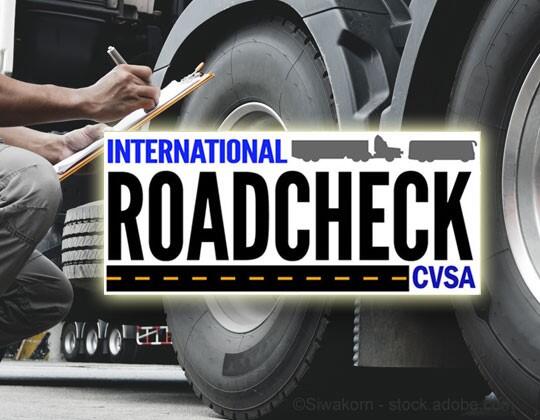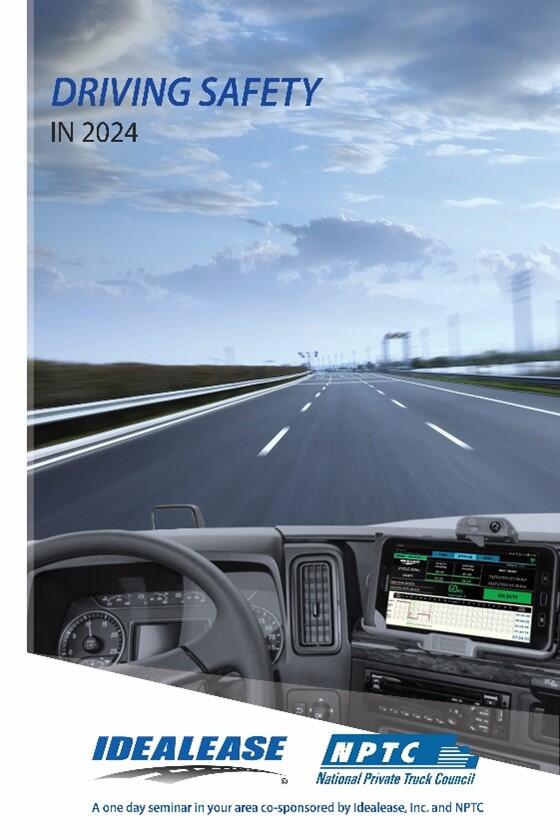Move Over, It's the Law
We have rolled out a new issue of the Idealease Safety Bulletin! Read the full bulletin here and subscribe to receive all future Idealease Safety Bulletins here.
In this issue:
- The Big 12: Red Flag Violations
- CVSA’s International Roadcheck Is Set for May 14-16
- Registration Now Open for the 2024 Idealease/NPTC Safety Seminars!
All 50 states have enacted "Move Over" laws to safeguard law enforcement officers and other first responders stationed on the nation's roads. However, a staggering one-third of drivers remain oblivious to these crucial regulations, perpetuating traffic-related incidents as the primary cause of on-duty law enforcement fatalities. Breaching the Move Over law incurs fines and, in severe cases, imprisonment.
Consequently, in collaboration with law enforcement agencies and state highway safety offices, the National Highway Traffic Safety Administration (NHTSA) diligently strives to enhance awareness surrounding these life-preserving "Move Over" laws. The objective is to underscore the imperative of shielding public safety professionals who willingly endanger themselves to ensure motorists' safety.
Through concerted efforts with local organizations and leveraging earned and social media platforms, individuals can play a pivotal role in bolstering public understanding of "Move Over" laws, thereby contributing to preserving lives.
For more information, visit: NHTSA Move Over
Guidelines for Interacting with Law Enforcement During a Traffic Stop
The sight of flashing police lights in your rearview mirror can evoke anxiety for many drivers. Despite the discomfort, it's crucial to demonstrate cooperation when pulled over by a law enforcement officer. Your response from the moment those lights illuminate could influence the encounter's outcome, potentially affecting whether you receive a citation.
Upon noticing the flashing lights, promptly signal and safely maneuver your vehicle to the right side of the road. Choose a safe, level, and stable spot to pull over, preferably near where the violation occurred. This positioning showcases your cooperation and allows for better observation of the surroundings, which might be helpful if contesting the ticket.
After safely halting, switch off the engine, lower your window, and place your hands on the steering wheel. Remain inside the vehicle unless instructed otherwise by the officer. In low-light conditions, illuminate the interior of your vehicle. Avoid sudden movements or rummaging through belongings until requested, acknowledging that officers approach such situations cautiously due to potential risks.
While it's acceptable to acknowledge the officer, await their inquiries before engaging in conversation. Typically, they'll request your driver's license, vehicle registration, medical certificate, and access to your ELD data. Provide these documents promptly and refrain from questioning the officer's request.
If the officer's identity is uncertain, particularly in unmarked vehicles, wait to roll down your window until their credentials are verified. During the interaction, refrain from admitting guilt and offer concise responses to questions. Remember, attempting to dispute a citation during the stop will unlikely sway the officer's decision, and any statements made could be used in court.
Avoid unethical behavior, such as attempting to bribe the officer, as this is morally wrong and illegal. Understand that officers may only search your vehicle if probable cause exists or if there's a perceived threat to safety. Compliance with lawful requests, including exiting the vehicle if instructed, is crucial.
Signing a ticket does not imply guilt; it signifies acknowledgment of the citation and commitment to address it accordingly. Familiarize yourself with state-specific regulations regarding ticket signing.
Maintaining composure, cooperating with law enforcement, and adhering to legal protocols can facilitate a smooth and respectful interaction during a traffic stop.
When faced with a citation, you have several options to consider:
- Guilty Plea: You can opt to pay the citation, essentially admitting guilt and resolving the matter without appearing in court unless mandated by a judge.
- Not-Guilty Plea: Alternatively, you can plead not guilty, which will lead to a court date where you can present your defense and contest the citation.
- Ignoring the Citation: Ignoring the citation is strongly discouraged, as law enforcement will eventually pursue the matter, potentially resulting in license suspension and increased fines.
When an officer acts as both the issuer and adjudicator of a citation, such as during an inspection, you can challenge the citation through a DataQ Challenge. To effectively challenge the citation, gather all relevant documentation and present your case, citing regulations to support your arguments. If successful in demonstrating an error, the officer may amend or reduce the citation and associated penalties.
It's worth noting that carriers often refrain from hiring drivers with excessive points on their CDL or CSA records, contributing to the industry's driver shortage. Therefore, consider challenging any citations you disagree with to safeguard your career prospects.
For DataQ Challenges, visit secure.login.gov
Always prioritize adherence to traffic laws and safe driving practices. If you receive a citation, proceed judiciously to mitigate potential consequences and protect your finances and professional standing.
Guidelines for Reacting to Approaching Emergency Vehicles:
DO:
- Pull over to the nearest roadside and come to a complete stop until all emergency vehicles pass.
- Remain vigilant for multiple emergency vehicles approaching, and check your rearview mirror before merging back into traffic.
- Maintain a radio volume level that allows you to hear approaching emergency vehicles.
- Signal your intention to pull over, indicating awareness of the emergency vehicle's presence.
DON'T:
- Block intersections, even when yielding to emergency vehicles, as this poses safety risks.
- Follow an emergency vehicle responding to a call at a distance closer than 500 feet, as it violates traffic laws.
- Stop on bridges, curves, or hill crests; proceed cautiously until finding a safe spot to pull over.
- Suddenly, brake or stop directly in front of an emergency vehicle, especially considering the more considerable stopping distance required for large trucks, which can lead to severe consequences.
Have you been among the fortunate few chosen to complete the MIS form?
Every March, the Federal Motor Carrier Safety Administration (FMCSA) gathers data from employers regarding DOT drug and alcohol testing conducted in the previous calendar year. However, not all motor carriers must furnish data to the FMCSA; only those selected for the agency's sampling must do so.
How can you determine if your company has been selected?
In January of each year, the FMCSA informs organizations that they have been chosen to compile the Management Information System (MIS) form, which summarizes the carrier's alcohol and drug testing outcomes under 49 CFR Part 382. The MIS form must be submitted to the location specified by the FMCSA in its request by March 15, by Section 382.403.
As Appendix H to Part 40 outlines, all DOT modes utilize the MIS form and accompanying instructions for an annual summary report. The form is also available in electronic format from the DOT.
What if your company employs a consortium to oversee its program?
A service agent, such as a consortium or third-party administrator, may prepare the MIS report on behalf of a motor carrier. However, it is imperative that a company official, such as the designated employer representative, certifies the accuracy and completeness of the MIS report, regardless of who compiles it.
Is the MIS form utilized on other occasions?
Indeed, the MIS form is utilized when a motor carrier is directed to do so by the Secretary of Transportation, any DOT agency, or state or local officials vested with regulatory authority over the employer or any of its drivers. These instances encompass:
- Compliance reviews
- Focused investigations related to Drug and Alcohol Compliance BASIC
- Crash investigations involving suspected drug or alcohol involvement
- Inspection sweeps conducted during FMCSA's Drug and Alcohol Inspection Strike Force operations
During any of these enforcement contacts, a company may be requested to summarize the previous year's drug and alcohol test results.
CVSA's International Roadcheck Is Set for May 14-16

The Commercial Vehicle Safety Alliance (CVSA) has scheduled its International Roadcheck for May 14-16. This initiative, conducted over three days across Canada, Mexico, and the United States, is a prominent effort focusing on commercial motor vehicle inspection and regulatory compliance enforcement.
Certified law enforcement personnel from CVSA will inspect commercial motor vehicles and drivers at weigh/inspection stations, temporary sites, and mobile patrols to ensure adherence to federal, state, provincial, or territorial regulations. Data collected during the 72 hours of International Roadcheck will be analyzed and released later this summer.
Each year, International Roadcheck places particular emphasis on specific violation categories. For the current year, the initiative will concentrate on two main areas: tractor protection systems and alcohol and controlled substance possession.
The issue of controlled substance and alcohol possession/use remains a significant concern for motor carriers, drivers, and the public at large. The rising number of prohibited drivers documented in the U.S. Drug and Alcohol Clearinghouse (DACH) underscores this pressing issue, posing risks to all motorists across North America.
Throughout the three days of International Roadcheck, inspectors will conduct the routine North American Standard Level I Inspection, which involves a 37-step procedure examining vehicle components and driver documentation and requirements.
For further details on Roadcheck 2024, visit: https://www.cvsa.org/news/2024-international-roadcheck/

Saint Patrick's Day Drunk Driving Prevention - March 17
Saint Patrick's Day stands as one of the most perilous holidays on our nation's roads. Over the 2017-2021 Saint Patrick's Day holiday period (from 6 pm on March 16 to 5:59 am on March 18), a staggering 272 lives were tragically lost due to drunk-driving crashes.
Remember, Buzzed Driving is Drunk Driving. For further insights into the Buzzed Driving Is Drunk Driving campaign, please visit TrafficSafetyMarketing.gov.
As Saint Patrick's Day falls on a Sunday this year, it is anticipated that alcohol consumption will escalate both on that day and throughout the weekend. Hence, it's crucial to celebrate responsibly. This responsibility begins even before heading out to celebrate, by determining who will serve as the designated sober driver or arranging alternative transportation such as ride-sharing services or taxis.
Drunk driving not only violates the law and entails severe financial penalties, but it also poses a deadly threat to the intoxicated driver, passengers, pedestrians, and other motorists on the road.
According to the National Highway Traffic Safety Administration (NHTSA), a staggering 13,384 individuals lost their lives in alcohol-impaired motor vehicle traffic crashes in 2021 alone, constituting 31% of all traffic fatalities in the United States that year. This grim statistic translates to someone succumbing to a drunk driving crash every 39 minutes on our nation's roads in 2021.

Registration Now Open for the 2024 Idealease/NPTC Safety Seminars!
Driving Safety in 2024
Idealease and the National Private Truck Council (NPTC) are excited to announce the opening of registration for the 2024 Safety Seminars. These one-day seminars will focus on crucial topics such as safety data analysis, basic safety and compliance, regulation changes, and CSA.
Who Can Attend: These seminars are open to all Idealease customers, potential customers, and NPTC members, and are provided at no charge.
Seminar Highlights:
- Gain insights into safety practices and compliance regulations.
- Learn about the latest advancements in safety technology.
- Understand CSA (Compliance, Safety, Accountability) and its impact on your operations.
Why Attend: Whether you're a novice or experienced transportation professional, these seminars offer valuable information to enhance your safety practices.
Registration Details: Seminars are currently available for registration, with venues secured for the following locations:
Spring 2024
- 4/10/24: Sun Prairie, WI
- 4/18/24: Frankfort, KY
- 5/9/24: Tampa, FL
- 5/21/24: Portland, OR
- 5/23/24: Santa Rosa, CA
Fall 2024
- 10/1/24: Eugene, OR
- 10/3/24: San Leandro, CA
Note: If you don't see a seminar in your area listed yet, don't worry. Registration availability will be updated weekly as venues are secured. Keep an eye on this bulletin for the latest updates.
To register for an upcoming seminar in 2024, click on the following link: Safety Seminar Registration. Don't miss out on this opportunity to enhance your safety knowledge and practices in 2024. Register today!
*The Idealease Safety Bulletin is provided for Idealease locations and their customers and is not to be construed as a complete or exhaustive source of compliance or safety information. The Idealease Safety Bulletin is advisory in nature and does not warrant, guarantee, or otherwise certify compliance with laws, regulations, requirements, or guidelines of any local, state, or Federal agency and/or governing body, or industry standard.
